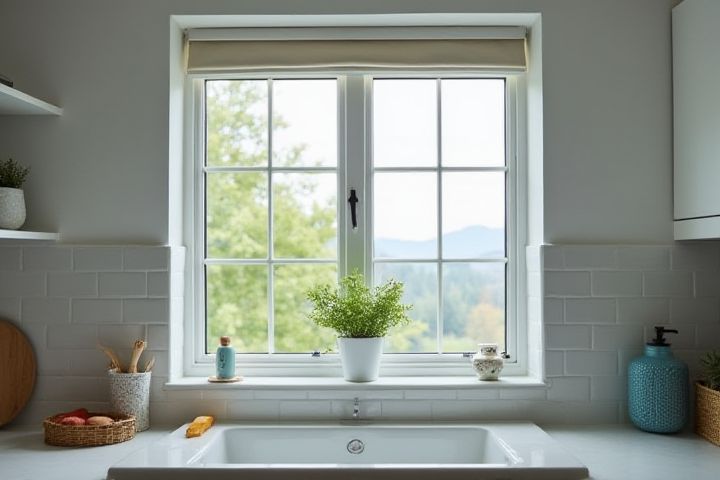
Replacing house windows can significantly enhance energy efficiency, reduce utility costs, and improve indoor comfort. Over time, windows may develop drafts, condensation, or cracks, compromising insulation and security. Upgrading to energy-efficient models can provide better thermal performance, leading to lower heating and cooling expenses. New window designs also come with advanced technologies, such as Low-E coatings and argon gas fills, which help regulate indoor temperatures. If your windows are over 15 years old or show signs of deterioration, investing in replacement could be a wise decision for your home's long-term value and appearance.
Should House Windows Be Replaced
Energy efficiency improvements
Replacing house windows can significantly enhance energy efficiency, leading to reduced heating and cooling costs. Modern energy-efficient windows feature advanced technologies such as double or triple glazing, low-emissivity (Low-E) coatings, and gas fills like argon to minimize heat transfer. By selecting windows with a high Energy Star rating, you ensure optimal insulation and performance, contributing to a more comfortable living environment. Investing in new windows not only improves your home's energy efficiency but also increases its overall value and aesthetic appeal.
Cost analysis and budget
Replacing house windows typically involves a thorough cost analysis, factoring in materials, labor, and potential energy savings. Vinyl windows often offer a budget-friendly option, ranging from $300 to $700 per window, while wood frames can cost between $800 and $1,200 each. Investing in energy-efficient double or triple-pane windows may lead to significant reductions in heating and cooling costs over time, although the initial investment is higher. By assessing your budget and calculating long-term energy savings, you can make a more informed decision about whether window replacement is a financially viable enhancement for your home.
Increased home value
Replacing house windows can significantly enhance your property's value, making it more appealing to potential buyers. Energy-efficient windows, often equipped with low-E coatings, help reduce heating and cooling costs, which is a crucial selling point in today's market. New windows not only improve curb appeal with modern designs and colors but also boost your home's insulation, contributing to lower energy bills. By investing in window replacement, you're likely to see a favorable return on investment, often recouping a substantial portion of the cost when selling your home.
Advanced window technology
Replacing house windows can significantly enhance energy efficiency, leading to savings of up to 30% on heating and cooling costs. Advanced window technology, such as triple glazing and Low-E coatings, offers improved insulation and UV protection, preventing heat loss in winter and keeping interiors cool in summer. High-performance gas fills like argon or krypton can further reduce thermal transfer, making your home more comfortable year-round. Investing in modern window options can not only elevate your property value but also contribute to a sustainable living environment.
Noise reduction benefits
Replacing house windows can significantly enhance noise reduction, creating a quieter living environment. Double or triple-pane windows, designed with gas-filled chambers, effectively minimize sound transmission from outside. Proper installation is crucial, as gaps or poor seals can allow noise to penetrate. Investing in high-quality, soundproof windows not only improves comfort but can also boost property value by enhancing your home's appeal.
Safety and security upgrades
Replacing house windows can significantly enhance your safety and security. Modern windows often feature multi-point locking systems, which provide greater resistance against forced entry compared to older models. Impact-resistant glass can withstand extreme weather conditions and burglar attempts, offering an added layer of protection for your home. Furthermore, upgrading to energy-efficient windows can also improve insulation, potentially lowering your energy bills by 15-20% while keeping your living environment secure and comfortable.
Aesthetic enhancement
Replacing house windows significantly enhances the aesthetic appeal of your home, providing a fresh and modern look that can elevate its overall curb appeal. New window designs, such as casement, double-hung, or sliding styles, can reflect your personal taste while improving the architectural harmony of your property. Energy-efficient windows also come in various colors and finishes, allowing you to match your home's exterior seamlessly. By investing in aesthetic-focused window replacements, you not only improve visual attractiveness but also increase your home's value and marketability.
Maintenance considerations
Replacing house windows requires a keen focus on maintenance considerations. Energy-efficient windows can reduce heating and cooling costs by up to 30%, making regular inspections essential to maintain efficiency. Choosing low-maintenance materials, such as vinyl or fiberglass, can significantly decrease the frequency of upkeep, allowing you to enjoy your home without the hassle of frequent repairs. Keeping weatherstripping intact and checking seals annually helps prolong the lifespan of your windows, ensuring optimal performance year after year.
Impact on natural light
Replacing house windows can significantly enhance the amount of natural light entering your home, which directly contributes to a brighter and more welcoming atmosphere. High-quality windows can increase daylight penetration by up to 30%, allowing you to enjoy natural illumination that reduces your reliance on artificial lighting. Energy-efficient windows, equipped with low-emissivity (Low-E) coatings, not only optimize natural light but also minimize UV rays that can fade furniture and flooring. Choosing the right window style and placement can transform your living space, making it feel larger and more open while also improving your well-being.
Warranty and lifespan of new windows
When considering the replacement of house windows, the warranty offered by manufacturers can significantly impact your investment's longevity. Most modern windows come with warranties ranging from 10 to 50 years, reflecting their expected lifespan and durability. Your choice should also factor in materials, as vinyl windows typically last 20-40 years, while wood windows may require replacement in 20 years depending on maintenance. Understanding these elements ensures that you select windows that not only enhance your home's energy efficiency but also provide long-term protection and value.
